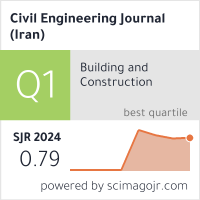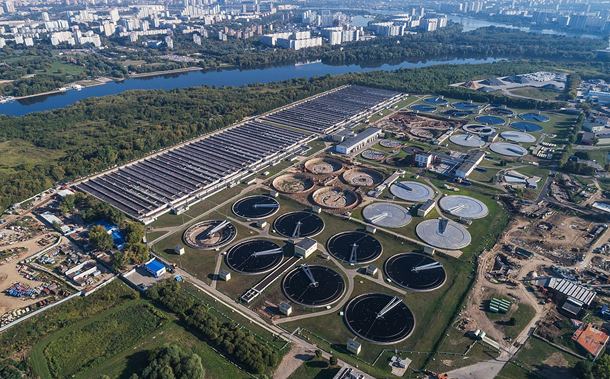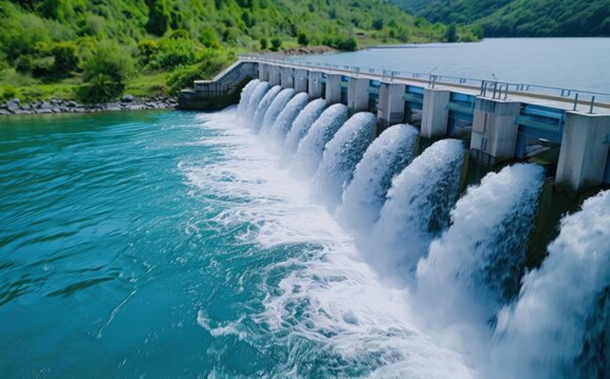Ethiopian Dam Optimum Hydraulic Operating Conditions to Reduce Unfavorable Impacts on Downstream Countries
Downloads
Doi:10.28991/CEJ-2022-08-09-011
Full Text:PDF
Downloads
[2] Abdel-Shafy, H., & Aly, R. (2002). Water issue in Egypt: Resources, pollution and protection endeavors. Central European Journal of Occupational and Environmental Medicine, 8(1), 3–21.
[3] Sharaky, A.M., Hamed, K.H., Mohamed, A.B. (2017). Model-Based Optimization for Operating the Ethiopian Renaissance Dam on the Blue Nile River. Grand Ethiopian Renaissance Dam versus Aswan High Dam. The Handbook of Environmental Chemistry, 79. Springer, Cham, Switzerland. doi:10.1007/698_2017_188.
[4] Oestigaard, T. (2010). Nile issues: small streams from the Nile Basin Research Programme. Fountain Publishers, Kampala, Uganda.
[5] Suter, M. (2016). The Politics of Water: What We Know About the Grand Ethiopian Renaissance Dam. Atlantic Council, Washington, United States. Available online: https://www.atlanticcouncil.org/blogs/menasource/the-politics-of-water-what-we-know-about-the-grand-ethiopian-renaissance-dam/ (accessed on August 2022).
[6] El-Askary, H., Fawzy, A., Thomas, R., Li, W., Lahaye, N., Linstead, E., Piechota, T., Struppa, D., & Sayed, M. A. (2021). Assessing the vertical displacement of the grand Ethiopian renaissance dam during its filling using DInSAR technology and its potential acute consequences on the downstream countries. Remote Sensing, 13(21), 4287. doi:10.3390/rs13214287.
[7] Andualem, T. G., Kassa, M., Getachew Demeke, G., Hewa, G., Dar, I. A., Pham, Q. B., & Yamada, T. J. (2021). Grand Ethiopian Renaissance Dam and hydrologic hegemony over Abbay Basin. Sustainable Water Resources Management, 7(6), 1–11. doi:10.1007/s40899-021-00568-y.
[8] Mohamed, H. I. (2017). Grand Ethiopian Renaissance Dam Impact on Long Term Operation of High Aswan Dam Reservoir. International Journal of Water Resources and Arid Environments, 6(1), 89–95.
[9] Mulat, A. G., & Moges, S. A. (2014). Assessment of the Impact of the Grand Ethiopian Renaissance Dam on the Performance of the High Aswan Dam. Journal of Water Resource and Protection, 06(06), 583–598. doi:10.4236/jwarp.2014.66057.
[10] Keith, B., Epp, K., Houghton, M., Lee, J., & Mayville, R. (2014). Water as a conflict driver: Estimating the effects of climate change and hydroelectric dam diversion on Nile river stream flow during the 21st century. Center for Nation Reconstruction and Capacity Development, Military Academy West Point, United States.
[11] Abtew, W., Dessu, S.B. (2019). Grand Ethiopian Renaissance Dam Reservoir Filling. The Grand Ethiopian Renaissance Dam on the Blue Nile. Springer Geography, Springer, Cham, Switzerland. doi:10.1007/978-3-319-97094-3_7.
[12] El Baradei, S. A., Abdelkader, S. E., & Hussein, N. H. (2022). Impact of filling period of the grand Ethiopian renaissance dam on hydropower generation and hydropower water footprint of Aswan high dam. Innovative Infrastructure Solutions, 7(5), 1–9. doi:10.1007/s41062-022-00872-2.
[13] Heggy, E., Sharkawy, Z., & Abotalib, A. Z. (2021). Egypt's water budget deficit and suggested mitigation policies for the Grand Ethiopian Renaissance Dam filling scenarios. Environmental Research Letters, 16(7). doi:10.1088/1748-9326/ac0ac9.
[14] Abou Samra, R. M., & Ali, R. R. (2021). Detection of the filling phases of the Grand Ethiopian Renaissance dam using sentinel-1 SAR data. Egyptian Journal of Remote Sensing and Space Science, 24(3), 991–997. doi:10.1016/j.ejrs.2021.11.006.
[15] Kansara, P., Li, W., El-Askary, H., Lakshmi, V., Piechota, T., Struppa, D., & Sayed, M. A. (2021). An assessment of the filling process of the grand Ethiopian renaissance dam and its impact on the downstream countries. Remote Sensing, 13(4), 1–17. doi:10.3390/rs13040711.
[16] Wheeler, K. G., Jeuland, M., Hall, J. W., Zagona, E., & Whittington, D. (2020). Understanding and managing new risks on the Nile with the Grand Ethiopian Renaissance Dam. Nature Communications, 11(1), 1–9. doi:10.1038/s41467-020-19089-x.
[17] Baker, N. J., Boubée, J., Lokman, P. M., & Bolland, J. D. (2020). Evaluating the impact of hydropower on downstream migrating anguillid eels: Catchment-wide and fine-scale approaches to identify cost-effective solutions. Science of the Total Environment, 748, 141111. doi:10.1016/j.scitotenv.2020.141111.
[18] Esler, J. G., Rump, O. J., & Johnson, E. R. (2005). Steady rotating flows over a ridge. Physics of Fluids, 17(11), 1–15. doi:10.1063/1.2130740.
[19] El Baradei, S. A., Imam, E. H. (2011). Optimum operating rules for barrages. ICASTOR Journal of Engineering, 4(1), 17-27.
[20] AbuZeid, K. (2020). GERD & Ethiopian Water Resources: Is it an "Aspiration for Hydropower” or "Hegemony for Water Power”?!. Ahram Online. Available online: https://english.ahram.org.eg/NewsContent/4/0/372290/Opinion/GERD--Ethiopian-Water-Resources-Is-it-an-Aspiratio.aspx (accessed on August 2022).
[21] Bárdossy, A., & El Hachem, A. (2021). Assessment of Water Quantity. In Handbook of Water Resources Management: Discourses, Concepts and Examples (pp. 443–469). Springer. doi:10.1007/978-3-030-60147-8_14.
[22] El-Nashar, W. Y., & Elyamany, A. H. (2018). Managing risks of the Grand Ethiopian Renaissance Dam on Egypt. Ain Shams Engineering Journal, 9(4), 2383–2388. doi:10.1016/j.asej.2017.06.004.
[23] Ahmed, A. T., & Elsanabary, M. H. (2015, March). Hydrological and environmental impacts of Grand Ethiopian Renaissance Dam on the Nile River. Proceedings of the Eighteenth International Water Technology Conference, IWTC18, 12-14 March, 2015, Sharm El Sheikh, Egypt.
[24] Aziz, M. (2020). Egypt's water challenges: Beyond the dam saga. Ahram Online website. Available online: https://english.ahram.org.eg/NewsContent/1/64/359272/Egypt/Politics-/Egypts-water-challenges-Beyond-the-dam-saga-.aspx#:~:text=With%20the%20increase%20in%20Egypt's,a%20country%20in%20water%20poverty (accessed on May 2022)
[25] Ferguson, D. (2014). Greywater systems: can they really reduce your bills? The Guardian. Available online: https://www.theguardian.com/lifeandstyle/2014/jul/21/greywater-systems-can-they-really-reduce-your-bills (accessed on May 2022).
[26] Kadry, A. (2022). Ambitious desalination plans. Ahram Online website. Available online: https://english.ahram.org.eg/ NewsContent/50/1201/389410/AlAhram-Weekly/Egypt/Ambitious-desalination-plans.aspx (accessed on August 2022).
[27] Miguelez, C. (2021). How Much Does It Cost to Install a Rainwater Collection System?. Available online: https://www.fixr.com/ costs/rainwater-collection-system (accessed on August 2022).
- Authors retain all copyrights. It is noticeable that authors will not be forced to sign any copyright transfer agreements.
- This work (including HTML and PDF Files) is licensed under a Creative Commons Attribution 4.0 International License.![]()















